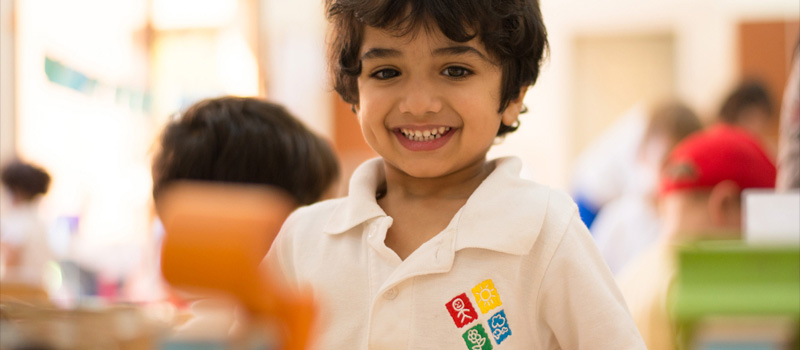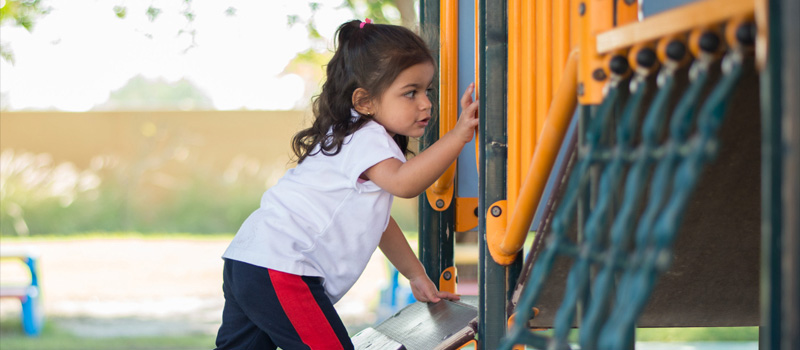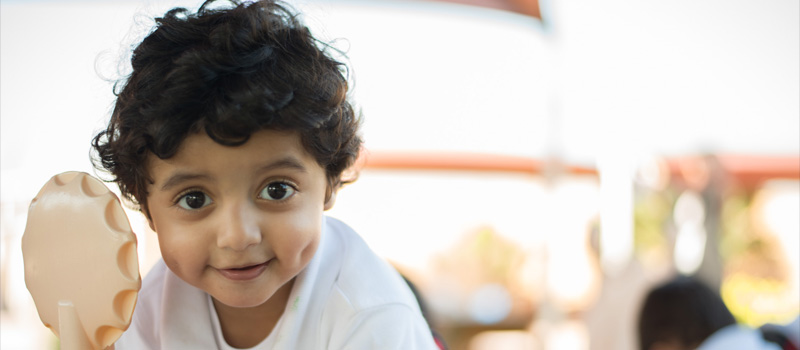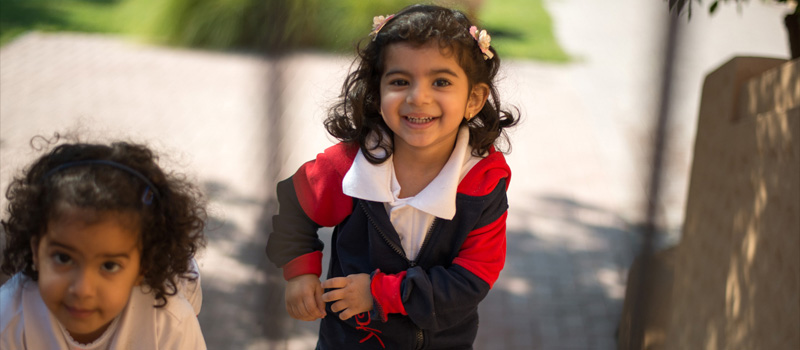Founders’ Message
Ajyaal Montessori, founded in 2006, was born from a deep desire to offer our children the best possible bilingual education in their most critical formative years. Like all parents, we want our children’s unique and individual strengths to be recognised, developed and nurtured in a positive and empowering environment.
Montessori education is a highly developed and widely tested method which encourages the special abilities of each child. Have celebrated its one-hundred-year year anniversary in 2007, Montessori is one of the leading educational theories and methods around the world. It has been shown to foster personal independence, high self-worth, deep thinking, concern for others, and a love for learning and school.
We strive in every way to create a community of faculty, staff and parents who are passionate about child advancement, educational excellence and cultural enrichment. Our aim is to set a new standard for early childhood education in the region, informed by the Montessori Method and the latest science on child development.
Aseel bint Khalifa Al Khalifa and Yara Ghazi Algosaibi
Our Approach
Why Ajyaal Montessori Pre School?
At Ajyaal, we strive to create a place of excellence, of unsurpassed standards for the provision of quality childcare, where beauty is most notably in the hearts and souls of the people who work here.
What does Montessori mean?
The Montessori Method is named after Dr. Maria Montessori, the first woman doctor in Italy, who devoted her adult life to the observation and study of children. Rather than ‘teaching’ a child concepts, the Montessori environment is designed to stimulate the child's interest and facilitate their understanding and learning with little or no adult intervention. In this environment, the child is an active participant in their learning process rather than a passive recipient of information.
Why should I send my child to preschool?
Most educators and psychologists today agree that the single most important period in the development of a person's intelligence occurs between birth and age six. A child's mind is extremely absorbent, and their curiosity is at a peak during these early years. When properly nourished and stimulated, the child's mind forms patterns for learning that serves them well throughout their life. The Montessori system of preschool education is one of the most effective methods to guide a child through these critical years.
What is in a Montessori classroom?
To a child, the world can be overwhelming, big, complex, and confusing. The Montessori classroom is an environment that is carefully prepared enticing the child to proceed at their own pace from simple activities to more complex ones. Through this process, the child's natural curiosity is satisfied, and they begin to experience the joy of discovering the world around them.
What is a typical day in a Montessori classroom?
Children come into the school, greet the teachers, put away their school bags, and begin their day. They move about the classroom from activity to activity, unrolling a small rug for work on the floor or sitting at a table, talking or working with a friend or choosing to work alone. The materials in the classroom are grouped into the areas of Practical Life, Sensorial, Math, Language, Art, and Cultural. Throughout the day teachers give individual presentations of the activities in these areas.
Towards the end of the morning, the children gather in a circle to hear a story read aloud, share news and sing songs. Each day ample time is spent playing outside.
What is Ajyaal's approach regarding snacks?
The food children eat has a direct link with all aspects of their development - from their general health and well-being, to their ability to concentrate, behave appropriately, understand and learn.
At Ajyaal, we encourage good eating habits to ensure that our children enjoy a happy and healthy lifestyle and in so doing, get the most of their school day. Each parent receives a ‘Lunch Box Ideas Leaflet’ on our Orientation Day at the beginning of the year.
We also strongly urge parents to ensure that all children have a good night's sleep and a healthy breakfast before coming to school.
What is the Montessori teacher trained to do?
The Montessori teacher is trained to understand the development of the children in her care. She is experienced in observing children and using those observations to plan for each individual child in her class. She aids the child in exploring every area of the classroom and works through the plan during the week, ensuring that each child receives presentations of all the activities planned. The observations also aid the teachers to set up the classroom in such a way that every child's interests and needs are met. All the teachers at Ajyaal are trained in First Aid and receive continuous in-house training covering all areas of early childhood education.
With all the freedom, isn't there confusion?
The concept of freedom in the classroom is a freedom within limits. A child may work freely so long as they do not disturb others. Children who have the freedom to follow their interests are generally happy and busily involved in their work.
What is the best age to enrol a child in Montessori?
Maria Montessori outlined various periods of "sensitivity." During these times, a child is capable of and interested in learning specific concepts. Between the ages of 2 to 3, a special sense of order, concentration, coordination, and independence begins to emerge. This time is ideal to enrol a child in a Montessori preschool as they are at the perfect period to build a strong foundation for future learning.
Classes
Children choose work from the beautiful and well-defined areas of the classroom. Beauty is a key component of the classroom. Montessori believed that beauty and nature brought forth the most positive instincts in the child. The classrooms are purposefully designed using neutral colours as bright and colourful rooms tend to over stimulate a child, whereas the natural tones enhance peace, calm and a better opportunity to focus.
Our setting is distinguished by its bilingual programme. Both English and Arabic teachers work daily, side-by-side, in the same classroom, offering children maximum exposure to both languages. From the moment children are born until about the age of five years a child attains language with almost no direct teaching. They absorb the language in their environment without difficulty, no matter how complex the language is.
Working with Montessori materials helps develop coordination, concentration, independence, and a sense of order. Order is strongly emphasized by Montessori not because it keeps a room tidy but because it helps the child to organise their mental and physical development.
Each classroom incorporates the following five areas:
The Practical Life area: activities include many of the tasks that children see as part of their daily routine, such as pouring liquids, preparing foods, washing hands, dusting, sweeping and taking care of the environment.This area enhances the development of eye-hand coordination, gross and fine motor control and independence.
The Sensorial area: materials are specially designed to help children learn accurate information about physical properties of the environment. Each piece of sensorial material isolates one quality such as dimension, colour, weight, smell, or sound.This area also enables the child to order, classify, and describe sensory impressions in relation to length, width, temperature, mass and colour.
The Mathematics area: this area makes use of concrete manipulative materials to promote the child's innate mathematical ability in his early years.These materials enable the child to internalize concepts of number, symbol, quantity, sequence, and operations.
The Language area: this area includes the development of spoken and written expression, reading, grammar, creative story telling, and children's literature. Basic skills in writing and reading are developed using sandpaper letters, moveable alphabet, and various activities that aid children to link sounds with letter symbols effortlessly.
The Cultural area: activities in this area expose the child to basics in geography, history, and sciences. Art, music and movement are also part of the integrated cultural curriculum.
Physical Activities: In a Montessori classroom children are always on the move, carrying activities from the shelves to the tables or rugs to work, wiping up a spill or washing windows. Games, music and movement activities are played daily indoors. During ‘outside time’ children enjoy the freedom to run and play using bikes, swings and a well-equipped play area as well as supervised and organised play activities. All these activities aid children in refining their large and small motor skills.
A sense of community is developed within the class as children learn how to live well together. Older children are responsive to the needs of the younger children. Children can choose to work alone or with others. This balance between the freedom of the individual and the needs of the group is fundamental to all Montessori environments.
Facilities
The school is nestled in a garden in Al Hamala, one of the most untouched areas in Bahrain, far away from busy streets, noise and clutter. The unique setting offers the child a sense of security. The whole environment is child-centered featuring child-size sinks in the classrooms and child-size facilities in the bathrooms. Everything is conceived for the safety, comfort and inspiration of the children. A large and fully equipped multi-purpose hall is available for extra-curricular activities and indoor use on hot or cold days. The outdoor play area includes facilities for sand and water activities, and gardens where children can enjoy planting flowers and vegetables.














